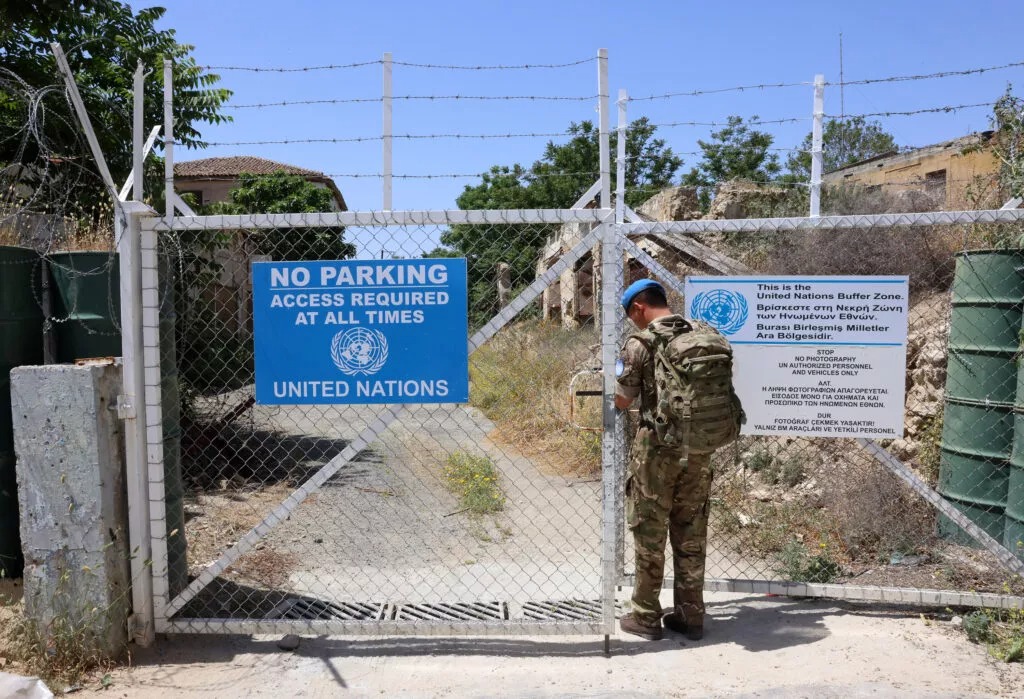Growing frustration within the United Nations regarding the ongoing stalemate in the Cyprus issue is palpable. Efforts are underway to devise a phased plan to address the impasse, with the Personal Envoy of the Secretary-General spearheading initiatives.

Proposed steps include facilitating a meeting between Secretary-General Antonio Guterres and both President Christodoulides and Turkish Cypriot leader Ersin Tatar, tentatively scheduled for September in New York. The primary objective of this meeting is to establish consensus on the subsequent phase, which entails convening an expanded conference akin to previous ones in Geneva and Crans Montana. However, garnering participation from the occupying side remains a significant challenge.
In anticipation of these developments, the UN’s Personal Envoy, Maria Angela Holguín Cuéllar, is expected to visit Cyprus in mid-June for further consultations aimed at paving the way for the initial joint meeting.
Holguín’s mission has been extended by three months to accommodate the proposed plan, underscoring the urgency to either break the deadlock or confirm its continuation by September.
Despite the necessity of extending Holguín’s mission, objections have been raised by Ersin Tatar, representing the occupying faction, who demands acknowledgment of sovereign equality and equal international status. Nevertheless, Tatar’s resistance may not impede the extension, as the decision ultimately rests with Guterres. However, his stringent conditions for participation undermine prospects for progress.
Secretary-General Guterres himself is visibly perturbed by the reluctance of the occupying side to engage constructively, as evidenced by Tatar’s refusal to meet with President Christodoulides.
Holguín, cognizant of the complexities involved, endeavors to maintain equilibrium in her approach, recognizing the need for concessions from Nicosia to facilitate dialogue with the Turkish side.
Efforts to foster Confidence Building Measures (CBMs) persist, acknowledging the intricate nature of the Cyprus Problem and the challenges inherent in addressing its core issues.
The UN underscores the importance of incentivizing the occupying side, despite reservations from the Cypriot government and awareness of the differing stances of Athens and Ankara.
Discussions with Greek Foreign Minister Giorgios Gerapetritis affirm Greek support for convening an expanded conference, while Ankara’s position, largely aligned with Tatar’s, poses a formidable obstacle.
Backed by Erdogan’s directives, the Turkish Ministry of Foreign Affairs remains committed to bolstering the occupying regime, further complicating prospects for resolution.
Holguín’s return to Cyprus in June is anticipated, during which she may present proposals for discussion in preparation for the envisioned joint meeting, with the ultimate aim of progressing towards a new conference.
While optimism is tempered by Turkey’s steadfast stance, Guterres reiterates his commitment to exhaust all available avenues for resolution.
Concerns linger regarding the aftermath of another potential failure, particularly in light of recent economic agreements between Turkey and the occupying regime, signaling ongoing support for infrastructure projects in the occupied areas.
These agreements, exemplified by the recent protocol for economic and financial cooperation, underscore Turkey’s sustained investment in the region, despite mounting frustrations over the perpetuation of the Cyprus issue.
Projects outlined in these agreements encompass various sectors, including infrastructure, healthcare, and agriculture, emphasizing Turkey’s ongoing commitment to bolstering the occupying regime’s development.
As discussions continue and tensions persist, the path towards resolution remains fraught with challenges, underscoring the imperative of sustained diplomatic efforts and international engagement to address the longstanding Cyprus issue.








